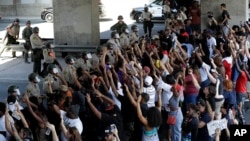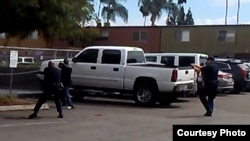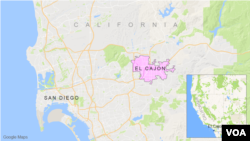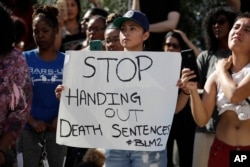Protesters yelled "murder" and demanded on Wednesday a federal investigation after an unarmed black man in Southern California was shot and killed, less than two weeks after similar incidents in two other U.S. cities sparked renewed outrage over police brutality.
Two officers responding to several calls for help in dealing with a mentally unstable person confronted an African-American man in his 30s walking in traffic in the San Diego suburb of El Cajon, according to local police.
One policeman opened fire with his service pistol, while the other officer at the same time fired off a Taser stun gun — after the man pulled an unspecified object from his pants pocket and took aim at them in a "shooting stance," according to police. However, no weapon from the man was recovered from the scene, police said.
Police did not immediately identify the victim, but local activists and friends named him as Ugandan-born Alfred Olango.
They said he was mentally ill and that he may have been suffering a seizure in the moments before his death.
Federal court records show that Olango, 38, fled to the United States from Uganda with his family in 1991 because the east African country's then-president, for whom Olango's father worked, had threatened to kill them.
According to court documents from 2006, he had been granted permanent U.S. residency but lost that status in 2001 after he was convicted of selling cocaine. As of 2006, records showed, a deportation order against him was still pending.
One of two officers dispatched to the scene had been trained as part of the San Diego County's Psychiatric Emergency Response Team, or PERT, El Cajon police said.
Days earlier, two black men were killed by police under questionable circumstances in Charlotte, North Carolina, and Tulsa, Oklahoma, igniting demonstrations against racial bias in U.S. policing and demanding greater accountability for law enforcement officers.
The shooting in Charlotte sparked a week of sometimes violent protests, prompting authorities there to impose a state of emergency and curfew.
Cries for 'justice'
In El Cajon, a predominantly white city of about 100,000 residents with a significant community of immigrants from the Middle East and Africa, civil rights activists and as many as 300 protesters gathered outside the police department, where they chanted "murder," "justice for Alfred Olango" and "black lives matter."
"We are not going to stop until we get justice," the Reverend Shane Harris, president of the National Action Network's San Diego chapter, said at the demonstration. "We do not trust local prosecutors to investigate local police."
"Mr. Olango was killed for three strikes against him. The first strike, being black. The second strike, being mentally ill. The third strike, not following orders," said Christopher Rice-Wilson, a community activist.
Police acknowledged that emergency dispatchers had received three calls about a man suffering from mental distress before dispatching two patrol officers, who encountered the man pacing back and forth behind a restaurant, at mid-afternoon Tuesday. The man disregarded officers' commands to show both his hands as they tried talking with him.
The two officers then fired simultaneously when the man suddenly placed his hands together, armed extended, pointing an unknown object at them. Olango died after being taken to the hospital.
El Cajon Police Chief Jeff Davis told reporters later that no weapon was found at the scene. He did not say what the man appeared to be pointing at police.
"Now is a time for calm," Davis said. "I implore the community to be patient with us, work with us, look at the facts at hand before making any judgment."
The officers were placed on administrative leave.
Police said they obtained cellphone video that a bystander had taken of the shooting. But authorities released only a still frame from the footage that shows two officers pointing weapons at a man who was aiming an object at them.
In a separate video clip taken moments after the shooting and posted on social media, a woman who refers to herself as the victim's sister is heard crying in anguish.
"Oh my God. You killed my brother. I just called for help and ... you killed him," the unidentified woman says, sobbing.
Agnes Hassan, a refugee from Sudan, told the rally she had spent time in a refugee camp with Olango before they both moved to the United States.
"We suffered too much with the war in Africa, and we come here just to suffer again?" she said. "My heart is just broken."
The San Diego District Attorney was investigating the shooting, and police spokesman Lieutenant Rob Ransweiler said the video filmed by the bystander could be released once that investigation is completed.








